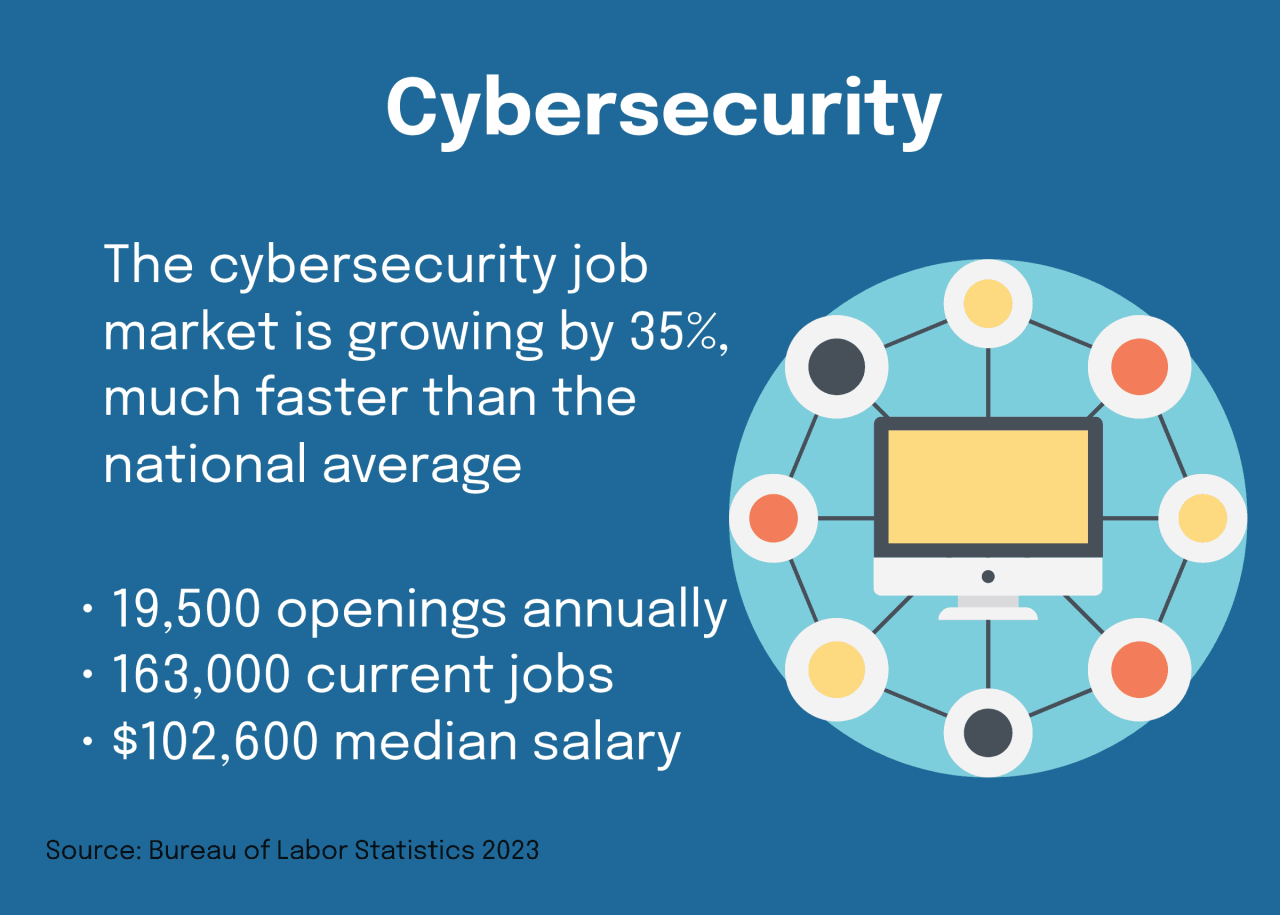Cybercrime degree online opens a gateway to the ever-evolving realm of digital security, where the battle against cyber threats rages on. As the world becomes increasingly reliant on technology, the need for skilled professionals who can mitigate risks and safeguard information is paramount. This degree equips students with the knowledge and skills necessary to navigate the complexities of cybercrime, ensuring they are well-prepared for a variety of career paths in this critical field.
Students pursuing a cybercrime degree can expect to engage in a diverse curriculum that includes courses on ethical hacking, digital forensics, and cyber law. The significance of obtaining such a degree in today’s digital landscape cannot be overstated, as cyber threats continue to escalate, impacting both individuals and organisations alike. With a solid educational foundation, graduates will find themselves at the forefront of an industry dedicated to protecting vital information.
Overview of Cybercrime Degree Online

A cybercrime degree online is an academic programme designed to equip students with the necessary skills and knowledge to combat the growing threat of cybercrime. As our world becomes increasingly digitised, the demand for professionals who can understand, mitigate, and respond to cyber threats is at an all-time high. This degree not only opens doors to diverse career opportunities but also plays a crucial role in safeguarding individuals and organisations against cyber threats.
The curriculum of a cybercrime degree typically encompasses a variety of subjects that cover both the technical and policy aspects of cybercrime. Students learn about computer systems, network security, and the legal frameworks surrounding cyber activities. This combination is essential for developing a well-rounded understanding of the field.
Common Courses in Cybercrime Degree Programs
The courses offered in cybercrime degree programmes are meticulously designed to provide students with a comprehensive foundation in the field. These courses may include but are not limited to:
- Introduction to Cybersecurity: This foundational course covers the basics of cybersecurity principles, including risk management and the importance of safeguarding information.
- Ethical Hacking: Students learn about penetration testing and the methodologies used by ethical hackers to identify vulnerabilities in systems.
- Cyber Law and Policy: This course explores the legal aspects of cybercrime, including legislation, privacy concerns, and the challenges of enforcing laws in a digital context.
- Digital Forensics: Students are trained in the techniques used to investigate digital crimes, including the collection, preservation, and analysis of electronic evidence.
- Network Security: This course delves into the intricacies of protecting computer networks and the strategies employed to defend against cyber attacks.
The relevance of obtaining a degree in cybercrime cannot be understated. With the rise in cyber threats such as identity theft, data breaches, and ransomware attacks, organisations are in dire need of skilled professionals who can navigate these challenges. According to a report from the Cybersecurity & Infrastructure Security Agency (CISA), cyber incidents have surged by over 400% since the onset of the global pandemic, emphasising the urgent need for trained specialists in the field. A degree in cybercrime not only provides students with essential skills but also prepares them to significantly contribute to the protection of critical infrastructure and sensitive data in our increasingly interconnected world.
Advantages of Pursuing an Online Cybercrime Degree

The decision to pursue an online degree in cybercrime presents a myriad of benefits that cater to modern learners. Distinct from traditional classroom settings, online programmes offer unique advantages that accommodate various lifestyles and commitments. This flexibility, coupled with cost considerations, makes online cybercrime degrees increasingly appealing.
Flexibility of Online Programs
The flexibility afforded by online learning is a major draw for many students. With the ability to access course materials and lectures at any time, learners can tailor their studies around personal and professional commitments. This is particularly beneficial for those balancing work, family, or other responsibilities. Students are empowered to create a study schedule that best suits their needs, thus enhancing their educational experience.
Moreover, online programmes often provide a variety of learning resources, such as recorded lectures, interactive forums, and digital libraries, enabling students to engage with content in diverse ways. Such an approach not only accommodates different learning styles but also allows students to revisit challenging topics as needed.
Cost-Effectiveness of Online Degrees
Pursuing an online cybercrime degree can be significantly more cost-effective compared to traditional on-campus studies. Below are several factors contributing to the financial advantages of online education:
- Reduced Tuition Fees: Many online programmes offer lower tuition rates than their on-campus counterparts, making higher education more accessible.
- Elimination of Commute Expenses: Studying online negates the need for transportation costs associated with travelling to campus, a significant saving for many students.
- Flexible Payment Options: Many online institutions provide various payment plans and financial aid options that can ease the burden of tuition fees.
- No Additional Costs for Campus Amenities: Students save on costs related to campus facilities, such as parking fees, library fees, and other associated expenses.
The combination of these factors makes an online cybercrime degree a financially prudent choice for prospective students, allowing them to focus on their education without the added stress of financial strain.
“The digital frontier of education offers not just flexibility and accessibility, but also a pathway to success in the evolving landscape of cybercrime.”
Key Skills Developed in Cybercrime Degree Programs: Cybercrime Degree Online

The realm of cybercrime is ever-evolving, necessitating a robust set of skills cultivated through specialised education. Pursuing a degree in cybercrime equips students with both technical and soft skills that are crucial for navigating the complexities of the digital landscape and combating cyber threats. This educational journey not only enhances one’s expertise in digital security but also prepares individuals for various professional roles across multiple sectors.
The skills acquired in cybercrime degree programmes are paramount for effectiveness in fields such as law enforcement and corporate security. Ethical hacking and digital forensics stand out as essential competencies that allow professionals to identify vulnerabilities, investigate cyber incidents, and implement security measures. In addition to technical know-how, soft skills like critical thinking and communication are equally vital, enabling cybercrime experts to articulate their findings and collaborate with diverse teams.
Essential Technical and Soft Skills
The following is a detailed overview of the technical and soft skills developed through cybercrime education, illustrating their relevance in the industry:
Technical Skills:
- Ethical Hacking: Professionals learn to identify security vulnerabilities in systems by employing the same techniques as malicious hackers, thereby safeguarding organisations against potential breaches.
- Digital Forensics: This skill involves the recovery, analysis, and reporting of data from digital devices, crucial for understanding cyber incidents and aiding in legal proceedings.
- Network Security: Students gain insights into protecting network infrastructures against unauthorised access and cyber threats, ensuring data integrity and confidentiality.
- Incident Response: Training covers protocols for responding to and managing cyber incidents, which is vital for minimising damage and restoring normal operations.
- Malware Analysis: Understanding how malware operates is essential for developing effective countermeasures and improving overall cybersecurity posture.
Soft Skills:
- Critical Thinking: The ability to analyse complex problems and derive logical solutions is paramount in developing effective security strategies and incident response plans.
- Communication: Clear articulation of technical information to non-technical stakeholders is essential for promoting awareness and understanding of cyber risks.
- Team Collaboration: Working in multidisciplinary teams necessitates strong interpersonal skills to foster collaboration and innovation in addressing cybersecurity challenges.
- Adaptability: Given the fast-paced nature of cyber threats, the ability to adapt and learn new technologies and methodologies is crucial for ongoing professional development.
- Attention to Detail: Precision in analysing data and identifying anomalies is vital for effective threat detection and prevention.
Career Opportunities After Earning a Cybercrime Degree
Graduates with a degree in cybercrime can expect to find themselves in a robust job market, with numerous opportunities that reflect the increasing need for security in a digital world. As cyber threats grow in complexity and frequency, organisations are actively seeking skilled professionals who can navigate this challenging landscape. This section explores the diverse job roles available to cybercrime graduates and highlights the industries that are keen to employ them.
Job Roles for Cybercrime Graduates, Cybercrime degree online
The range of potential career paths for individuals holding a cybercrime degree is extensive and varied. Graduates are equipped with the necessary skills to take on roles that are essential for safeguarding information and assets. The following list showcases notable job titles along with the industries that frequently recruit for these positions:
- Cybersecurity Analyst – These professionals work across various sectors, including finance, healthcare, and government, analysing security measures and implementing solutions to protect sensitive information.
- Information Security Manager – Often found in corporate environments, these managers oversee information security strategies, ensuring compliance and risk management across the organisation.
- Digital Forensics Expert – Working in law enforcement and private security firms, these specialists are tasked with investigating cyber incidents and recovering data from digital devices.
- Network Security Engineer – Employed in tech companies and telecommunications, these engineers design and maintain secure network infrastructures to mitigate potential breaches.
- Ethical Hacker – Frequently engaged by corporations and security firms, ethical hackers simulate cyber attacks to identify weaknesses in a system’s security.
Industries Actively Seeking Cybercrime Graduates
Various industries are recognising the importance of cybersecurity and are actively recruiting individuals with a cybercrime degree. These sectors include, but are not limited to, the following:
- Finance and Banking – Financial institutions require rigorous security measures to protect sensitive customer data and prevent fraud.
- Healthcare – With the rise of telemedicine and digital health records, hospitals and clinics need experts to safeguard patient information.
- Government – National and local government agencies hire cybercrime professionals to secure sensitive governmental data against cyber threats.
- Technology – IT firms constantly seek innovative talents to bolster their cybersecurity frameworks and protect against evolving cyber threats.
- Retail – E-commerce and brick-and-mortar retailers alike are investing in cybersecurity to protect customer information and transactions.
Salary Expectations and Job Outlook
The following table Artikels the salary expectations and job outlook for various positions within the cybercrime field. This data reflects the increasing demand for skilled professionals and the competitive nature of salaries in this domain.
| Job Title | Average Salary (per annum) | Job Outlook (2021-2031) |
|---|---|---|
| Cybersecurity Analyst | £40,000 – £70,000 | 32% growth (much faster than average) |
| Information Security Manager | £60,000 – £100,000 | 33% growth (much faster than average) |
| Digital Forensics Expert | £45,000 – £75,000 | 28% growth (much faster than average) |
| Network Security Engineer | £50,000 – £90,000 | 28% growth (much faster than average) |
| Ethical Hacker | £45,000 – £85,000 | 25% growth (much faster than average) |
“The demand for cybercrime professionals is expected to grow substantially, reflecting the urgent need for enhanced cybersecurity measures in all sectors.”